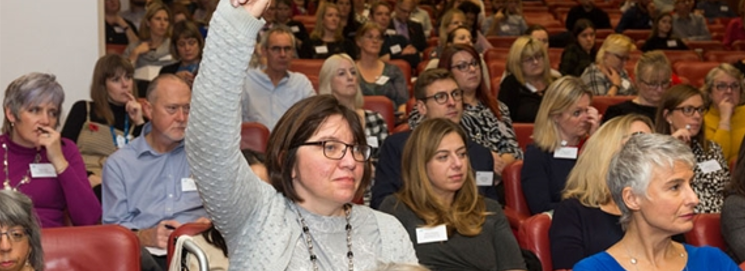
Dr Andrew Bateman, UKABIF Chair, and James Piercy, UKABIF Trustee and Science communicator, welcomed over 250 delegates to the organisation’s 11th Annual Conference, held in November at London’s Royal Society of Medicine. The words ‘time for change’ echoed throughout the day as the conference programme discussed the workstreams flowing from the All-Party Parliamentary Group (APPG) on Acquired Brain Injury (ABI) report ‘Acquired Brain Injury and Neurorehabilitation: Time for Change’ published in September 2018.
Opening the conference Professor David Menon, Head, Division of Anaesthesia, University of Cambridge and Honorary Consultant, Neurosciences Critical Care Unit, Addenbrooke’s Hospital, Cambridge said:
There is a burden of mortality over a 10-12 year period post-injury due to the chronic sequelae, and also infection susceptibility, which results from immune response modulation. This burden reinforces the need for long-term care. Professor Menon discussed the key issues in the ‘Time for Change’ report and said: “UKABIF and the APPG on ABI have made a huge impact in raising awareness of ABI and driving change. We need to continue to ensure individuals with life-long disability receive the long-term care and support they require.
Professor David Menon
A head-on collision in France in 1998 left the second speaker of the day, Dr Raymond Lynch, with debilitating brain and spinal injuries. Through determination and the help of a neuropsychologist he turned his life around and, with the support of his employer Proctor and Gamble (P&G), now consults with the UK Government and London-area hospitals on brain injury. Dr Lynch discussed the ‘Return To Work’ Toolkit that he has developed for P&G employees worldwide with brain injury, their managers, peers and families.
Unfortunately due to the General Election the MPs Chris Bryant, Liz Twist and Sir John Hayes, who are driving the APPG on ABI were unable to attend the conference. In their place Dr Bateman discussed the aspirations of the APPG and highlighted the considerable amount of work being done as a direct result of UKABIF and the APPG engagement.
Mental health and neurorehabilitation are traditionally segregated, but as Dr Mike Dilley, Consultant Neuropsychiatrist in Neurorehabilitation, Brain and Mind said: “Mental health needs to be integrated in to neurosciences and neurorehabilitation.” Neurological conditions and psychological problems are inextricably linked; studies have shown that there is an increased mortality after brain injury and mental health problems worsen life expectancy. Accessing mental services as part of a continuous chain of rehabilitation can be extremely challenging and early access is an essential part of recovery. “The system urgently needs to be integrated,” concluded Dr Dilley.
The focus on change was reiterated by Trevor Sterling, Partner at Moore Blatch because there has been no review of injury cost recovery since the Major Trauma Centres were introduced. Current legislation is outdated and the extent of the shortfall in injury costs to the NHS is unknown, resulting in the NHS being underfunded as a consequence. Mr Sterling said:
We urgently need new legislation, and as a minimum, a review of the existing legislation which could facilitate increased funding for neurorehabilitation.
Trevor Sterling
The Silverlining Brain Injury Charity, founded in 2006, shared the experiences of 23 of its members when they recently went to Namibia, Africa. The film of the group’s experience was a powerful reminder of the need and importance to invigorate, motivate, nurture and enable individuals with brain injury.
Drs Emily Bennett and Emily Talbot, Consultant Clinical Psychologists in Paediatric Neuropsychology, Nottingham Children’s Hospital, outlined the importance of communication, education, monitoring, and adapting in order to support children and young people with an ABI in the education system. Education is one of the work streams in the Time for Change report, with emphasis on the need to train teaching professionals about ABI, and facilitate change for children and young people with ABI.
Professor Diane Playford, Professor of Neurological Rehabilitation, University of Warwick and Consultant in Rehabilitation Medicine, South Warwickshire Foundation Trust and Ines Kander PhD student at Warwick University, highlighted once again the need to change the community rehabilitation system which is, at best ineffective, and at worst unavailable. Professor Playford said: “Commissioning services for neurorehabilitation is complex with Level 1 commissioned by NHS England, Level 2 by the Clinical Commissioning Groups and no clear pathway for Level 3. Health professionals work in silos and consequently individuals with ABI fall between the cracks.” Professor Playford reiterated the lack of Rehabilitation Medicine Consultants, Multidisciplinary Team members, poor information provision and inadequate long-term funding. “We constantly underestimate the number of individuals requiring neurorehabilitation in the community, and their inability to navigate the system. People need access to multiple services, neurorehabilitation for a longer time period and a Linkworker to facilitate progress through the pathway. We need to do it smarter and differently” concluded Professor Playford.
Several awards were presented during the conference. Two new UKABIF Chairs’ Merit Awards were presented to Susan Pattinson, Physiotherapist at STP Therapy Services and Hannah Farrell, Clinical Specialist Physiotherapist in Neuro-Traumatology, Queen Elizabeth Hospital Birmingham, in recognition for their work in making change happen in neurorehabilitation. The Stephen McAleese Award for Inspiration went to Dr Melanie George, Consultant Clinical Neuropsychologist, Kent and Medway NHS and Social Care Partnership Trust. The new Mike Barnes Innovation Award, run in collaboration with the National Institute for Health Research, went to Dr Penny Trayner, Paediatric Clinical Neuropsychologist at Clinical Neuropsychology Services Ltd. This year delegates were able to vote for the Poster Award which went to Charlie Flint of Chroma.
UKABIF would like to thank the conference sponsors Cygnet Health Care, Irwin Mitchell solicitors, Leigh Day, Manton Heights ABI Unit, Sintons Law and Stroke Active, the many companies that exhibited and the excellent poster presentations.